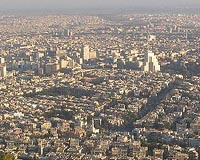| . |  |
. |
Tel Aviv, Israel (UPI) Mar 24, 2011 Amid a surge of terrorist attacks in recent days, Israelis are bracing for an escalation in violence and possibly a new invasion of the Hamas-ruled Gaza Strip. There are strong suspicions, and not just in Israel, that Iran is seeking to provoke a confrontation as the Arab world is battered by unprecedented political upheaval that has brought about the downfall of two presidents since January and now threatens others. As it is, Israelis are becoming increasingly concerned that the ouster of Egyptian President Hosni Mubarak Feb. 11 could lead to the unraveling of their 1979 peace treaty with Cairo, the core element of the Jewish state's strategic outlook. The turmoil in the Arab world also threatens stability in Jordan and the 1994 peace pact it signed. If the Hashemite monarchy crumbles, Israel would find itself again bordered by hostile Arab states. The peace treaties are widely reviled by the general population in both countries and new regimes could respond to that and shatter the political stability in those states that has helped keep the peace, however cold it may be. "This is a reason for concern, primarily because of the potential for an epidemic," said Oded Eran, director of Israel's Institute for National Security Studies and a former Israeli ambassador to Amman. "We cannot afford dramatic change in Egypt or Jordan." Israelis' abiding fear is that the upheaval will result in Islamist radicals taking power, or at least produce unfriendly regimes that aren't willing to tolerate Israel's war against terrorism. "This is not like Eastern Europe in the late 1980s," cautioned Eyal Zisser of the Moshe Dayan Center for Middle Eastern and African Studies in Tel Aviv. "This is not a region where stable dictatorships can be replaced with stable democracies. Here the alternative means chaos, anarchy and radicalism." Mubarak, who fought Islamist extremists tooth and nail, aided Israel by blockading Gaza, where Hamas militants unleashed rockets into Israel and carried out other attacks. He looked the other way when Israeli forces invaded the coastal strip in December 2008 and fought a 22-day war against heavily outnumbered Hamas fighters, killing some 1,400 people, mainly civilians, in the face of intense international criticism. If Israel is contemplating invading Gaza again, it is unlikely in the extreme that the transitional military regime in Cairo will be able to live with that. The recent upswing in violence began March 11 when five members of an Israeli family were killed, apparently by Palestinians, in their home in the West Bank settlement of Itmar. On March 19, Palestinian militants in Gaza fired 54 Grad rockets and mortar shells at the southern cities of Beersheba and Ashdod, the heaviest barrage since Operation Cast Lead, the 2008 invasion of Gaza. No deaths were reported but the Palestinian media quoted the Islamic Jihad group, which has close links with Tehran, as saying the salvo signaled a new campaign of attacking Israeli population centers. Israel retaliated with airstrikes that killed a Hamas official. Then Wednesday, a bomb exploded in Jerusalem, killing a 60-year-old woman and wounding 39 other people. It was the first terrorist attack in the holy city since 2008, which for several years was battered by a relentless Hamas suicide bombing offensive. Compared to earlier bombings Wednesday's was relatively minor but it shook Israelis badly by rekindling the terror of the suicide attacks. Deputy Prime Minister Silvan Shalom declared the army "may have to consider a return" to a new operation into Gaza. "I say this despite the fact that I know such a thing would, of course, bring the region to a far more combustible situation," he said. Iran has been blamed for covertly inciting riots in Bahrain, a Sunni-led Persian Gulf state where the majority of the population is Shiite. There are fears the trouble will spread to Saudi Arabia itself, as it has to Oman, Qatar and Kuwait, all major oil producers. Iran's main proxy in the Levant, Lebanon's Hezbollah, brought down the pro-Western government in Beirut in January and is now forming a new government that is ringing alarm bells in Israel. Hezbollah fought Israel's military to a standstill in a 34-day war in 2006. Both sides have been bracing for another bout.
Share This Article With Planet Earth
Related Links Democracy in the 21st century at TerraDaily.com
 Arab uprising infects 'immune' Syria
Arab uprising infects 'immune' SyriaCairo (UPI) Mar 22, 2011 The Syrian regime in Damascus, which President Bashar Assad recently claimed was "immune" from the political upheaval gripping the Arab world, is now grappling with street protests on a scale not seen for a generation. The trouble hasn't yet taken root in the heavily guarded capital of one of the Middle East's repressive states outside of the occasional skirmish. But the regime has crac ... read more |
|
| The content herein, unless otherwise known to be public domain, are Copyright 1995-2010 - SpaceDaily. AFP and UPI Wire Stories are copyright Agence France-Presse and United Press International. ESA Portal Reports are copyright European Space Agency. All NASA sourced material is public domain. Additional copyrights may apply in whole or part to other bona fide parties. Advertising does not imply endorsement,agreement or approval of any opinions, statements or information provided by SpaceDaily on any Web page published or hosted by SpaceDaily. Privacy Statement |